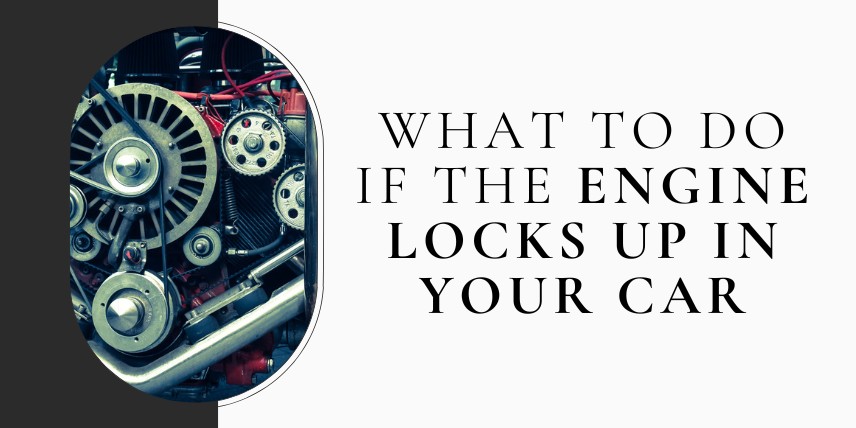
What to Do If the Engine Locks Up in Your Car
Your engine locks up in your car or it could seem to have shut up or seized. When you try to start your car, the engine won't even crank at all. Every car owner's worst dread has come true. As you rush to go to work, you get into your car and turn the key, only to discover that the engine won't start.
But this is just one of the causes of an engine stall. Despite the fact that it can also be caused by other problems, it is one of the most common and may also be the most expensive to repair. Perhaps when you least expect it, you start your automobile and hear an unusually loud clunking sound.
Despite the fact that the tank is full and the battery is brand new, your car won't start. The engine has probably seized or blown engine. What are your current options? Can you fix a seized engine? In this blog, we'll explain what to do if your engine locks up and go over your alternatives for fixing or selling your car in UAE.
What is a Seized Engine or Engine Locks Up in Your Car?
When an engine's internal parts face extreme friction, frequently as a result of insufficient lubrication or oil starvation, it develops into a serious mechanical problem known as a seized engine. In such circumstances, the engine's moving metal components scrape against one another, producing intense heat and causing the engine to "seize."
This can result in catastrophic failure and significant damage, frequently necessitating engine replacement as a whole. Engine seizure can be avoided with proper maintenance, which includes routine oil changes and checking the oil level in your used car's engine.
What to Do if Your Car’s Engine Locks Up?
If your engine becomes stuck, you'll find yourself in a challenging predicament. What would you do if you couldn't operate a vehicle? It might not always be the greatest choice to repair a locked engine because it can be pricey. Let's examine the signs of a locked engine and the remedies you have.
Understand the Symptoms of a Locked-Up Engine!
A "seized" or "locked" engine often happens as a result of a mechanical issue. A broken engine block or oil starvation are the usual causes of this. When an engine runs out of oil or the oil doesn't flow properly, internal metal parts scrape against one another, creating a lot of heat. Bearings made for smooth motion literally fuse to other parts when they grind against the crankshaft and camshaft.
You might experience this while you are driving. Your engine will typically make a loud noise before automatically shutting off. When engines seize as a result of a shortage of oil, damage to the engines can range from minor to major.
If an engine is not running properly owing to factors other than a lack of oil, it may potentially seize. The piston rings 'freeze' against the cylinder walls as a result of rusting. The majority of the time, this is seen in scrap cars that are about to be restored. However, the most frequent reason for a stuck engine is oil deprivation. Lack of use is another potential factor.

Try Implementing Some Fixes!
Knowing what causes a locked engine may have you wondering if there is a way to fix it and unlock it. A seized engine repair might be possible, depending on the underlying problem. The bad news is that a stalled engine caused by insufficient oil is nearly impossible to fix, even with a mechanic's assistance.
If this is the case, unsticking an engine can require replacing a number of them or, in the worst case, the entire engine. Components in your engine can sustain long-term damage from a lack of oil. As a final resort, you might need to sell your car for parts or to a car buyer like CarPoint.
If the engine is locking up due to gasoline vapor, you will need to wait until it has had time to cool down. With this adjustment, the gas might change back to a liquid. Another choice is to water-spray your gasoline pump. If an engine freezes as a result of water, you might have to pay for a replacement.
If your engine is seized after not being operated for a long time, there can be too much rust in the system. It's difficult to fix this without spending a lot of money. If the majority of the parts are rusted, no amount of repair will help. You'll have to get a new engine for your car. If you get in touch with a specialist as soon as you can, you might be able to rescue your engine.
Consider Selling Your Car!
If an engine is locked, you must carefully decide if it is worthwhile to fix it. It might or might not be worthwhile depending on your situation. Think about the severity of the issue and the expense of fixing it. There are some easy fixes that are virtually always worthwhile.
On the other hand, other causes of a locked engine can require more involved fixes that are more expensive. You still have some good options if you decide it's not worth it to fix your broken engine. You don't have to leave your car rusting and collecting dust in your garage or driveway.
Selling a car in its current condition is the most cost-effective strategy, and it can be done with ease through an online car buyer like CarPoint. After that, you can use that cash to put a down payment on a dependable new or used vehicle. This is frequently a much more economical choice than attempting to repair the engine. After all, buying a car doesn't come with the idea that it would last forever.

